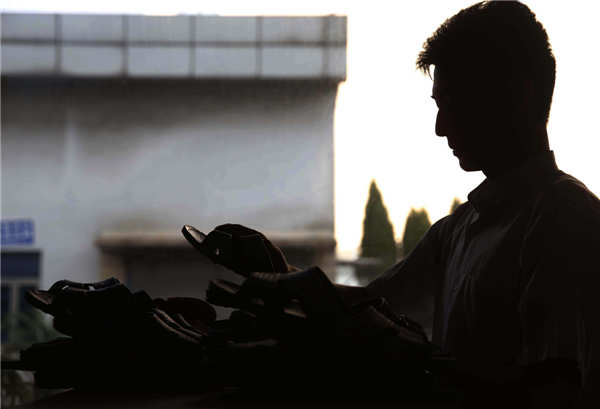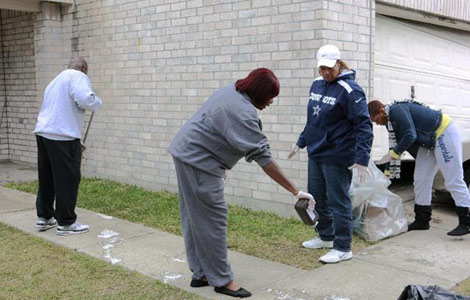A second opportunity
Updated: 2013-11-12 08:13
By Zhou Wenting (China Daily)
|
||||||||
 |
|
Zhao Haiming (not his real name) works at a bathhouse in Shanghai, which is one of 300 bases of observation in the city that offer an alternative to detention for youth offenders. Gao Erqiang / China Daily |
Tens of thousands of minors are involved in crimes every year in China.
In a country where most couples have only one child due to family planning regulations, when they turn out bad it can be a huge burden.
Liu Peng, also 17, was arrested in June. He had been working as a lookout for an underground gambling den in Shanghai.
"I knew the job might land me in trouble, but I'd have been disappointed if I'd left without making any money," said the native of Chuzhou in Anhui. "I decided to quit (and return home) after receiving my first month's salary, but I was captured before that."
Liu's arrest left his family in a mess, according to his mother, Kong Xiaowen. "We were a happy family and he's my only son. The family would be destroyed if he was sent to prison," she said.
The teenager was given a three-month suspended prison sentence, based on the prosecution's review of his behavior while working as a waiter at a Minhang hotel, another observation base.
"Prison can trigger opposition to society in individuals and their families, so the (observation base) approach helps to maintain stability," said Tong Lihua, director of the Beijing Youth Legal Aid and Research Center.
Social workers are encouraged to educate parents and keep a close eye on a juvenile after he or she returns to the family home.
Shanghai police recently arrested several people for using children to help them steal.
"No child is born with a problem, it usually lies with the family and the environment they grew up in," said Sun Yulian, a social worker in Minhang. "Sometimes we find it hard to talk to parents who show zero desire to change. But I still feel it's meaningful, even if they only remember one sentence out of 10 I say."
Positive effects
Legal aid experts and psychologists say Shanghai's method of observing young offenders to help them mend their ways is a good start, but they recommend adjustments to iron out the policy.
"It needs a unique key to open each heart, and some hearts are hard to open," Cui Lijuan, a psychology professor at East China Normal University, said in reference to the challenge for social workers. "If it was that easy to transform a person in half a year, we wouldn't need prisons."
She hailed the introduction of vocational training in the rehabilitation of young offenders, but insisted that continued support from trained professionals is vital to ensure they progress in the right direction.
"If someone has never had a fair chance to get an education or care, then it's difficult for him or her to develop a conscience toward society," she said.
Likewise, Yi Shenghua at Yingke Law Firm in Beijing urged social workers to make the most of the time they spend with the juveniles.
"They should give them guidance in the law, psychology, help steer their outlook on life," he said. "It would be a good idea to involve more people who work or used to work with judicial departments to help this."
As Zhao's case suggests, if the job is done well enough, offenders themselves can go on to have a positive effect on preventing others around them from turning to crime.
The 17-year-old said he has already devoured two books on positive thinking given to him by Ma.
"If I'd ended up in prison, I couldn't guarantee I wouldn't write myself off as hopeless, accept my label as a bad guy," he said. "But that part of my life is over.
"Now, if any of my friends ever thought of breaking the law, like I did, I'd definitely stop them. If I see others selling porn in the street, I'll warn them, too."
(Names of the juvenile offenders have been changed on request.)
contact the writer at zhouwenting@chinadaily.com.cn

 Typhoon Haiyan claims 6 in S. China
Typhoon Haiyan claims 6 in S. China
 Iran to give UN inspectors more access to nuclear sites
Iran to give UN inspectors more access to nuclear sites
 In love with Yunnan
In love with Yunnan
 Online shopping gala sets records
Online shopping gala sets records
 Traditional retail battles websites
Traditional retail battles websites
 Report shows jump in Chinese students going to the US
Report shows jump in Chinese students going to the US
 2 killed in Texas party shooting
2 killed in Texas party shooting
 Singles Day becomes China's Black Friday
Singles Day becomes China's Black Friday
Most Viewed
Editor's Picks

|

|

|

|

|

|
Today's Top News
Global talent lacking in China
Journalists lead lonely-heart list
Iran to give UN inspectors more access
Reform expected to dominate talk at plenum
Real-estate bubble seen bursting
More Chinese students going to US
Online shopping gala sets records
Typhoon Haiyan claims 6 in S. China
US Weekly

|

|







